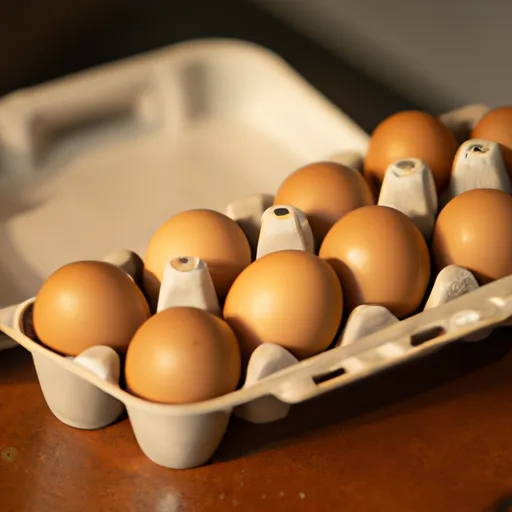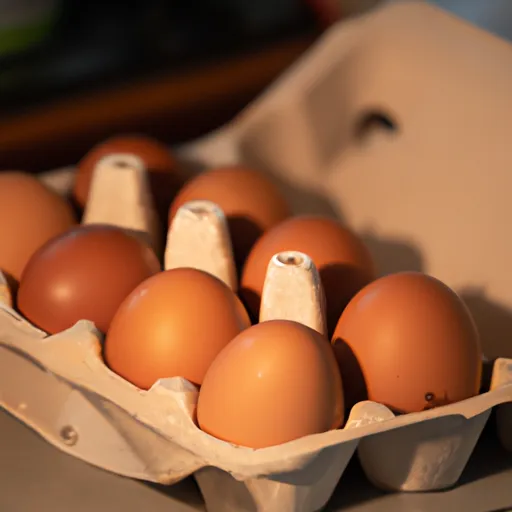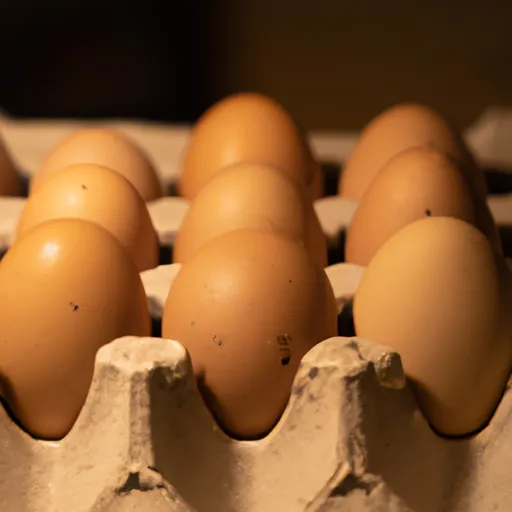Storing Chicken Eggs What You Need To Know
Most of us love chicken eggs but do we really know that storing chicken eggs the right way will make them last longer.
Chicken eggs have been eaten throughout history so what have we learned and how can we benefit from this knowledge.
Let’s have a look…
Storing Chicken Eggs, Why Do You Put Eggs Point Down?
When you are storing your chicken eggs you want to put the point of the chicken egg down
The reason for this is that on the inside of a chicken when the egg is forming in the hen it forms in this teardrop shape with a point and then a blunt end.
And that point when it is coming out of the Abba duct of the hen, it is coming out spinning like a torpedo point first and before the chicken lays that egg.

Yes, Really!
Now, these clever hens will actually turn that egg around so that it drops out blunt.
When a hen goes into her laying box, she could be there for a while, depending on the chicken, and just how close she is to laying.
If she has taken her time in getting into the laying box, she could lay very quickly.
But if she has arrived in good time she could be sitting on her nesting box for a while…
When she feels the urge to lay her egg she gets into a squat position and drops her bottom end down fluffing up her feathers as she pushes out the egg.
Now, in chicken’s eggs, there’s a little of an air sac and that’s what the baby chick is going to use to breathe and get a little oxygen before it actually hatches.
And because chicken eggs are porous the air sac will grow over time now the air sacs in the blunt end which hits and kind of buffers but not in the pointy end of the egg.
So when you are storing chicken eggs you want to put the pointy end down, so that the air sac remains in the blunt end.
And if it doesn’t, then you know if you store it this way that air sac is going to move up through the egg itself…
And in this case, it’s going to move some stuff around and get to where it wants to be up the top of the egg whichever way you have placed it.
So if you store your chicken eggs with the blunt end down, all the egg white which is alkaline you know, a non-bacterial conducive environment is going to stay down below, and it’s going to protect that yolk
Then the yolk of the egg is going to get infected a lot quicker than the egg white is, and that air is going to stay on top.
And if you keep your eggs in storage for a long, over time that air is going to grow.
See also Raising The Right Chicken Breed - Chicken Breeds That Lay Eggs.
So putting it in layman’s terms to make it simpler…
If you store the egg with the fat end down, that air pocket has a tendency to rise.
Not completely through the egg mind you, but enough to reach the yolk.
By storing eggs fat-end up, the pocket of air stays away from the yolk, and your eggs are going to stay fresher longer.
Why You Should Not Keep Eggs In The Fridge?
When it comes to keeping eggs in the fridge, it can cause the growth of bacteria on the shells themselves and this can then enter the insides of the eggs porous surface.
Making them inedible.
So according to many studies, eggs should really be kept at room temperature ideally…
Now, I myself do not keep eggs outside the fridge, there is a reason for this, I mainly live in the sub-tropics and with the weather being warmer and also humid at times, eggs just don’t last as long.
And leaving them out, I will be worried if the eggs have gone off…
So, how long are fresh eggs good for?
You need to consider where you live as well to make your own final decision on this.
Can You Eat An Egg That Floats?
I think most of us are familiar with how you can test chicken eggs if it is still fresh and has not gone off.
And putting chicken eggs in a bowl of water, we can get confused if it is the egg that sinks that is fresh or is it the other way around…

Fill a bowl or glass of cold water deep enough for the egg to float will test if the egg is fresh or not.
You gently place your chicken eggs on the surface of the water, don’t hurl them in, or else the egg won’t be good for anything if you break it.
Those very fresh eggs will sink to the bottom of the water and lay on their sides.
Now, if an egg stays at the bottom but stands on its small end, it is still ok to eat; just not as fresh, that’s all…
But…
And there is a BUT!
An egg can sink to the bottom of the water and still be a bad egg.
While a chicken egg that floats may still be all right to eat…
So this method cannot be taken as 100% foolproof.
You really just need to use your instincts if an egg is fresh enough to eat when you have broken the egg.
If it is not fresh it will not be very solid in consistency and not as yellow in my experience…
If you are boiling a chicken egg, you can not do this, so just make sure you do use fresh eggs for this.
What Happens If You Don’t Refrigerate Eggs?
Now we are talking about what happens if you don’t refrigerate chicken eggs, gets confusing doesn’t it…
See also Laying Chickens: How Often Do Chickens Lay An Egg?
It is said that in the U.S alone, there are more than 140,000 cases of salmonella poisoning from eggs each year, according to the USDA.
And that salmonella can spread quickly when chicken eggs are left out at room temperature and not refrigerated.
As I said previously, if you live in a colder climate, your chicken eggs will most probably benefit from being at room temperature.
As it is with many things in our society, they say one thing then they say another.
I feel it’s best for you to be the judge and just use what is said to guide you, trial and error.
How Long Do Fresh Eggs Last Unrefrigerated?
It is said about two weeks, but there again it depends where you are, how cold your place is.
And also factors if you leave them in a place where the sun can get on them and warm them for different times of the day.
So just use your own judgement on this.
Also, unwashed chicken eggs will actually last at least two weeks refrigerated, and it is said as much as three months or more in the refrigerator.
And washed chicken eggs will last at least two months in your refrigerator, there again will not taste as fresh as the unwashed eggs of the same age.
Do Farm Fresh Eggs Need To Be Washed?
Some people might think that chicken eggs from a farm can be a bit messy, and the chickens might be walking over them with maybe dirty feet or that they could be laid out in the dirt.
This can be true…
However, you do not have to wash the chicken eggs until you actually use them, unless they are really soiled.
As the shell of the eggs is porous and the dirt can work its way into the inside of the egg itself if left long enough.
Fresh unwashed eggs do not need to be refrigerated for several weeks. Yet, unwashed fresh chicken eggs will keep the best.
Once you refrigerate your hen’s eggs, do not go and then put them out for some reason.
One way or the other, either refrigerate your egg or don’t refrigerate your eggs before use.
As the temperature changes will shorten your chicken eggs freshness value, and then they will start to go bad.

How long do fresh eggs last, is not a trick question…
Yet there are many factors to need to think about with your chicken eggs.
Just don’t take the word of one expert over another.
And most probably come in the middle of their findings and use your own mind to decide what is best for where you live and your egg storing environment.
